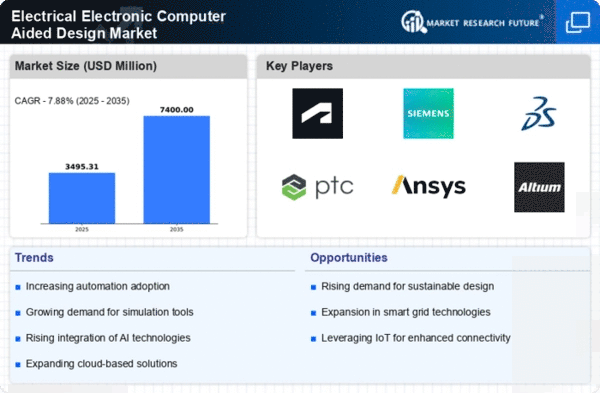Market Analysis
In-depth Analysis of Electrical Electronic Computer Aided Design Market Industry Landscape
ECAD, or Electronic Computer-Aided Design, stands as a transformative technology primarily utilized for design and technical documentation, replacing traditional manual drafting with more efficient automated processes. This software plays a crucial role in the design of Printed Circuit Boards (PCBs) and other electronic systems, finding significant applications in smart grids and smart metering.
In the realm of power utilities, especially in the context of smart grids and smart meters, the adoption of ECAD tools becomes imperative to achieve sustainable objectives. These tools facilitate the design of intricate electronic systems that form the backbone of modern power infrastructure, ensuring efficiency and reliability in the increasingly complex landscape of power utilities.
For power system operators and planners, ECAD software emerges as a vital asset, providing flexibility and robust capabilities to support the daily simulation and analysis work conducted by utility companies. The dynamic nature of power systems requires sophisticated tools like ECAD to navigate the complexities of grid management effectively. These software solutions empower operators and planners to simulate various scenarios, analyze data, and make informed decisions crucial for the seamless functioning of power grids.
One of the key advantages offered by ECAD software lies in its ability to minimize project rework and backlogs. By enabling designers to capture real-world conditions at the early stages of the design process, ECAD tools contribute to more accurate and efficient designs. This capability becomes particularly significant in the context of power utilities, where precision and reliability are paramount. Reducing rework not only saves time but also enhances the overall productivity of design teams.
Moreover, ECAD software is designed to evolve in tandem with the changing standards of smart grids. As the landscape of power utilities undergoes continuous transformation with the integration of smart technologies, ECAD tools ensure that designers can adapt to evolving standards seamlessly. This adaptability is crucial for staying abreast of the latest advancements in smart grid technologies and incorporating them into the design processes effectively.
In the context of smart grids and smart metering, ECAD software contributes to the efficiency and sustainability of power utilities. These advanced systems demand intricate designs that ECAD tools are well-equipped to handle. From designing complex circuitry to ensuring compliance with evolving standards, ECAD plays a pivotal role in shaping the future of power infrastructure.
ECAD technology is a cornerstone in the design and documentation processes within the realm of power utilities. Its applications extend to the design of critical components such as PCBs and electronic systems, especially in the context of smart grids and smart metering. The adoption of ECAD tools becomes essential for power system operators and planners, providing them with the flexibility and capabilities needed to navigate the complexities of modern power grids. With the ability to minimize rework, adapt to changing standards, and support sustainable objectives, ECAD software stands as a key enabler in the evolution of power infrastructure towards greater efficiency and reliability.



















Leave a Comment